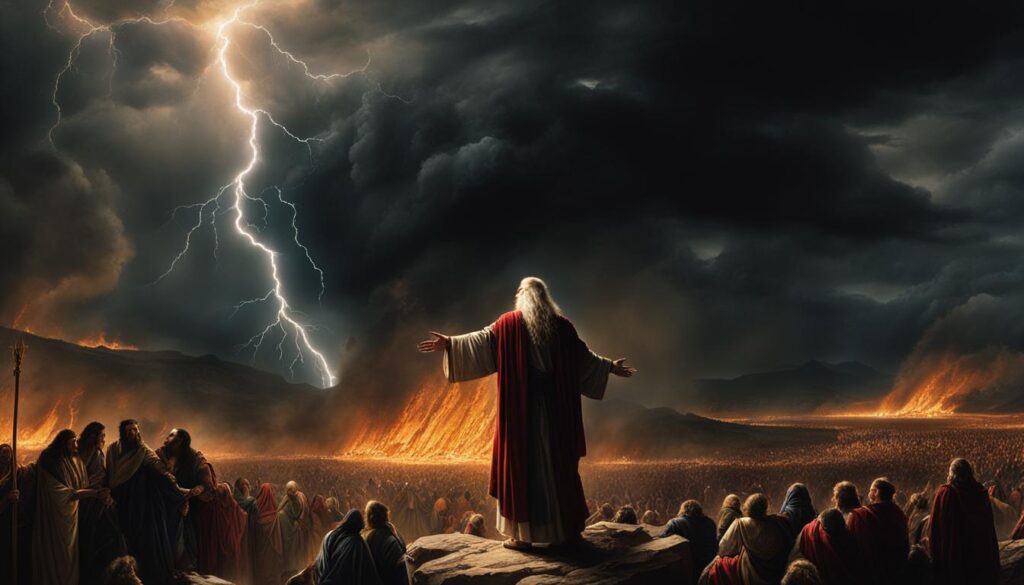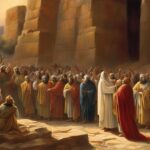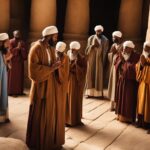Moses’ intercession for Israel is a profound and inspiring event recorded in the Old Testament. This biblical narrative showcases the power of intercession, the depth of God’s character, and the significance of spiritual leadership. Through Moses’ role as an intercessor between God and the Israelites, we gain valuable insights into the nature of God’s compassion, mercy, and justice.
Key Takeaways:
- Moses’ intercession for Israel holds deep spiritual lessons for believers today.
- Intercession involves pleading on behalf of others and seeking divine intervention.
- Moses’ encounter with God on Mount Sinai reveals God’s character and desire for relationship.
- The golden calf incident highlights the consequences of rebellion and the need for intercession.
- Intercessory prayer has the power to transform situations and invite God’s forgiveness.
Understanding God’s Character: The Proclamation on Mount Sinai
During Moses’ encounter with God on Mount Sinai, a profound revelation of God’s character occurred. In Exodus 34:6-7, God proclaims His name and unveils His attributes to Moses, providing a captivating insight into the essence of His identity. This proclamation showcases God’s compassion, mercy, and justice, allowing us to grasp a deeper understanding of His character and guiding our relationship with Him.
In this proclamation, God declares, “The LORD, the LORD, a God merciful and gracious, slow to anger, and abounding in steadfast love and faithfulness, keeping steadfast love for thousands, forgiving iniquity and transgression and sin, but who will by no means clear the guilty” (Exodus 34:6-7 ESV). This powerful declaration reveals God’s multifaceted nature. He is a God of compassionate love, extending mercy and forgiveness to those who repent. Yet, He is also just, holding the guilty accountable for their actions. Through this proclamation, we gain insight into the complexities of God’s character and the ways in which He interacts with His creation.
This revelation on Mount Sinai has profound implications for our understanding of God’s character and His interactions with humanity. It reminds us that God is not only a God of love and mercy but also a God of justice. His compassion and forgiveness are balanced by His righteous judgment, ensuring that His righteousness and holiness are upheld. This revelation challenges us to approach God with reverence, acknowledging His perfect balance of justice and mercy.
This powerful proclamation on Mount Sinai encapsulates the essence of God’s character—His boundless love, mercy, justice, and faithfulness. It serves as a beacon of light, guiding our understanding of who God is and how we can relate to Him.

The Proclamation on Mount Sinai: Key Attributes of God
| Attribute | Description |
|---|---|
| Merciful | God extends compassion and forgiveness to those who seek Him. |
| Gracious | God demonstrates kindness and generosity towards His creation. |
| Slow to Anger | God exercises patience and restraint, withholding His anger. |
| Abounding in Steadfast Love | God’s love is unwavering and enduring, overflowing with compassion. |
| Faithful | God is true to His promises and remains steadfast throughout time. |
| Just | God upholds righteousness and holds the guilty accountable for their actions. |
| Forgiving | God extends forgiveness to those who repent and seek His mercy. |
The Proclamation on Mount Sinai reveals the multifaceted nature of God’s character, showcasing His love, mercy, justice, and faithfulness. By understanding these attributes, we can deepen our relationship with Him and align our lives with His perfect will.
The Role of Intercession in Jesus’ Expectations
Jesus’s ministry was marked by his relentless pursuit of reaching out to the lost and the broken. As we explore Moses’ intercession for Israel in Exodus chapter thirty-two, we gain valuable insights into Jesus’ expectations for intercession and the responsibility of his followers to intercede on behalf of others.
Jesus emphasized the importance of evangelism and the intercessory role of believers in spreading the message of God’s love and redemption. He called his disciples to be witnesses and ambassadors, proclaiming the good news of the Kingdom to all nations. Just as Moses interceded for the disobedient and rebellious Israelites, Jesus desires his followers to intercede for those who are lost in sin, praying for their salvation and spiritual restoration.
In Matthew 9:37-38, Jesus said, “The harvest is plentiful, but the laborers are few. Therefore pray earnestly to the Lord of the harvest to send out laborers into his harvest.” This passage reveals Jesus’ expectation for his disciples to actively engage in intercession for the expansion of his Kingdom. Through intercession, believers partner with God in his redemptive work, seeking his guidance, provision, and spiritual breakthroughs in evangelism.
“Prayer is not asking. It is a longing of the soul. It is daily admission of one’s weakness. It is better in prayer to have a heart without words than words without a heart.” – Mahatma Gandhi
Intercession holds immense power in bridging the gap between lost souls and the saving grace of God. Through fervent prayer, believers can intercede for the unsaved, praying for opportunities, open hearts, and divine encounters with God’s love. As followers of Jesus, it is our calling to imitate his mission and engage in intercessory prayer, aligning our hearts with his purpose and actively participating in the advancement of his Kingdom.
By understanding the role of intercession in Jesus’ expectations, we can cultivate a heart of fervent prayer and partner with God in transforming lives through evangelism. Let us take up the responsibility of intercession, fervently praying for the lost, and trusting in God’s power to bring about spiritual breakthroughs and the salvation of souls.

The Fallout of the Golden Calf Incident
The incident of the golden calf was a defining moment in the relationship between God and the Israelites. It occurred during Moses’ absence on Mount Sinai, when the people succumbed to idolatry and turned away from the true God they had pledged to follow. This event had far-reaching consequences, highlighting the dangers of rebellion and the need for intercession to restore the broken relationship between God and His chosen people.
While Moses was receiving the Ten Commandments from God on the mountain, the Israelites grew impatient and approached Aaron, requesting that he make them a god to worship. Aaron, succumbing to the pressure, collected gold from the people and fashioned a golden calf, which the Israelites then worshiped and offered sacrifices to.
“You shall have no other gods before me. You shall not make for yourself a carved image, or any likeness of anything that is in heaven above, or that is in the earth beneath, or that is in the water under the earth.” – Exodus 20:3-4
The idolatry of the golden calf deeply grieved God, and He threatened to destroy the Israelites as a result. However, Moses interceded on their behalf, pleading with God to show mercy and forgiveness. Through Moses’ intercession, a disaster was averted, and the relationship between God and the Israelites was given an opportunity for restoration.
| Consequences of the Golden Calf Incident | Effects on the Relationship with God |
|---|---|
| The breaking of the covenant | Loss of trust and faithfulness |
| Divine judgment and punishment | Israel’s rebellion and disobedience |
| Moses’ intervention and intercession | God’s mercy and forgiveness |
| Restoration of the covenant | Growth in obedience and faith |
The fallout of the golden calf incident serves as a powerful reminder of the consequences of idolatry and the importance of intercession in seeking God’s mercy and forgiveness. It underscores the need for spiritual leaders to stand in the gap on behalf of the people, pleading for God’s intervention and restoration.
The Power of Intercessory Prayer
Moses’ intercession for Israel showcases the transformative power of prayerful intercession in seeking divine intervention and reconciliation. Through his prayers, Moses pleads for God’s mercy on behalf of the Israelites, demonstrating the profound impact of intercessory prayer.
In Exodus chapter thirty-two, we witness Moses’ deep concern for the Israelites and his unwavering faith in God’s compassion. Despite the Israelites’ disobedience and idolatry with the golden calf, Moses stands in the gap between God’s justice and the plea for mercy from the people. His intercession exemplifies the power of prayer to reach the heart of God, invoking divine intervention and forgiveness.
“Moses pleaded with the Lord his God and said, ‘Lord, why does your wrath burn against your people, whom you brought out of Egypt with great power and a mighty hand? Turn from your fierce anger; relent and do not bring disaster on your people. Remember your servants Abraham, Isaac, and Israel, to whom you swore by your own self: ‘I will make your descendants as numerous as the stars in the sky and I will give your descendants all this land I promised them, and it will be their inheritance forever.'” (Exodus 32:11-13)
Moses’ intercession highlights the essential role of prayer in seeking God’s intervention, mercy, and forgiveness. It reminds us that through prayer, we can bring our concerns, fears, and hopes before the Almighty, trusting in His willingness to listen and respond. Just as Moses stood before God on behalf of the Israelites, we too can stand in the gap for others, lifting them up in prayer and seeking God’s transformative power in their lives.

| Benefits of Intercessory Prayer | Examples of Biblical Intercessors |
|---|---|
|
|
The power of intercessory prayer extends beyond the immediate request to bring about spiritual transformation and renewal. As we intercede for others, we join in God’s redemptive work, partnering with Him to bring healing, reconciliation, and restoration. Through our prayers, we can witness the miraculous power of God’s intervention, leading to changed lives, renewed faith, and a deepened understanding of His love and grace.
Moses as the Mediator between God and Israel
Throughout the biblical narrative, Moses emerges as a powerful mediator between God and the Israelites. His unique role as an intermediary showcases his deep connection with God and his ability to bridge the gap between God’s justice and the pleas for mercy from the Israelites. Moses serves as the representative of Israel, faithfully interceding on their behalf and seeking God’s forgiveness and favor.
One prominent example of Moses’ mediation occurs during the incident of the golden calf, when the Israelites turned to idolatry in Moses’ absence. Upon witnessing this rebellion, God’s anger was kindled, and he threatened to destroy the disobedient nation. However, Moses intervened, fervently interceding for the people and pleading for God’s mercy. This act of intercession demonstrates Moses’ role as the mediator, skillfully navigating between the righteous judgment of God and the need for reconciliation with the Israelites.
Moses’ role as the mediator also highlights the importance of spiritual leadership in intercessory acts. As a leader chosen by God, Moses exemplifies the responsibility of guiding the people and standing as a representative before God. Through his steadfast intercession, Moses not only displays his deep concern for the welfare of the Israelites but also highlights the significance of leadership in seeking divine intervention and fostering a relationship with God.

The Example of Moses: Inspiring Spiritual Leadership
“Moses said to the Lord, ‘You have been telling me, ‘Lead these people,’ but you have not let me know whom you will send with me. You have said, ‘I know you by name and you have found favor with me.’ If you are pleased with me, teach me your ways so I may know you and continue to find favor with you. Remember that this nation is your people.'” – Exodus 33:12-13
Moses’ plea to God in Exodus 33 exemplifies his understanding of the intercessory role he fulfills as both a leader and a mediator. His desire to know God’s ways and to continue finding favor reflects his commitment to fulfilling his role faithfully. Moses serves as an inspiration for all spiritual leaders, reminding them of the importance of intercession and the responsibility to stand before God on behalf of their followers.
In conclusion, Moses’ role as the mediator between God and the Israelites showcases his unique connection with God and his ability to navigate between justice and mercy. As the representative of Israel, Moses faithfully intercedes on behalf of the people, seeking God’s forgiveness and favor. His example inspires spiritual leaders to embrace their intercessory role and guide their followers in seeking divine intervention and fostering a deep relationship with God.
God’s Mercy and Forgiveness in Response to Intercession
Moses’ intercession for Israel in Exodus chapter thirty-two showcases the powerful impact of prayerful intercession on invoking God’s mercy and forgiveness. In their desperate plea for mercy, the Israelites acknowledge their wrongdoing and turn to God for reconciliation. This act of intercession demonstrates the transformative power of prayer in seeking divine intervention and restoring the broken relationship between God and His people.
God’s response to Moses’ intercession illustrates His compassion and willingness to extend forgiveness. Despite the Israelites’ disobedience and idolatry, God shows mercy and grants forgiveness upon hearing their plea. This manifestation of God’s mercy highlights His desire to reconcile with His people and showcases the deep love and grace that He bestows.
“For you, Lord, are good and ready to forgive, and abundant in mercy to all those who call upon You.” – Psalm 86:5
Through Moses’ intercession, we witness God’s merciful nature and His desire to restore His relationship with His people. This event serves as a profound reminder of the power of intercessory prayer and the transformative effects it can have on both individuals and communities.
God’s Mercy and Forgiveness: A Table of Comparison
| God’s Mercy | God’s Forgiveness | |
|---|---|---|
| Definition | God’s compassionate and loving nature that extends grace and compassion. | God’s act of pardoning and granting forgiveness for sins and wrongdoing. |
| Relevance to Intercession | Intercession appeals to God’s mercy for forgiveness and reconciliation. | Intercession seeks God’s forgiveness on behalf of others and acknowledges the need for reconciliation. |
| Expression in Scripture | “The Lord is gracious and full of compassion, slow to anger and great in mercy.” – Psalm 145:8 | “If we confess our sins, He is faithful and just to forgive us our sins and to cleanse us from all unrighteousness.” – 1 John 1:9 |
| Outcome | God’s mercy leads to forgiveness, restoration, and reconciliation. | God’s forgiveness brings about healing, renewal, and a renewed relationship with Him. |
As believers, we are called to emulate God’s character of mercy and forgiveness, extending grace to others and interceding on their behalf. Through prayerful intercession, we have the opportunity to participate in God’s redemptive work and experience the transformative power of His mercy and forgiveness in our lives and in the lives of those around us.
The Revelation of God’s Justice and Mercy
The incident with the golden calf in Exodus chapter 32 serves as a powerful backdrop for the revelation of God’s justice and mercy. In the absence of Moses, the Israelites succumbed to idolatry, breaking their covenant with God. This act of disobedience triggered God’s wrath, and the consequences were severe. However, even in his righteous anger, God also reveals his merciful nature, offering a glimmer of hope for reconciliation.
As the Israelites worshiped the golden calf, God’s justice was demonstrated through his punishment. A plague struck the people, and those responsible for leading the rebellion faced severe consequences. This response showcases God’s righteous judgment against sin and his commitment to upholding justice.
“The Lord said to Moses, ‘Go down, because your people, whom you brought up out of Egypt, have become corrupt. They have been quick to turn away from what I commanded them and have made themselves an idol cast in the shape of a calf. They have bowed down to it and sacrificed to it and have said, “These are your gods, Israel, who brought you up out of Egypt.”‘ “
However, within this context of justice, God also reveals his merciful nature. In response to Moses’ intercession and plea for mercy on behalf of the people, God relents and does not carry out the full extent of his judgment. He shows compassion and forgives the repentant Israelites, highlighting the depth of his mercy and his willingness to reconcile with his people.
This interplay of God’s justice and mercy provides us with a profound understanding of his character. It reminds us that although God is just and righteous, he is also loving and forgiving. Through the incident with the golden calf, we witness the tension between God’s justice and his mercy, gaining insight into his ultimate desire for reconciliation and restoration.

| God’s Justice | God’s Mercy |
|---|---|
| God’s punishment and the consequences of sin | God’s willingness to forgive and reconcile |
| God’s righteous anger against idolatry | God’s compassion for the repentant |
| God’s commitment to upholding justice | God’s desire for restoration and redemption |
Through this revelation of God’s justice and mercy, we are reminded of the transformative power of repentance and intercession. Just as Moses pleaded for mercy on behalf of the Israelites, we too can approach God with humility and seek his forgiveness. We can trust in his unchanging character, knowing that he is both just and merciful, and that he desires to restore and reconcile with his people.
God’s Faithfulness and Covenant: A Testament to Unwavering Love
Throughout the narrative of Moses’ intercession for Israel, we witness the unwavering faithfulness of God and His commitment to His covenant with Abraham. Despite Israel’s faithlessness and their involvement in idolatry, God remains steadfast in His love and fulfills His promises. This powerful display of God’s faithfulness showcases the unchanging nature of His character and His relentless pursuit of His people.
In the Book of Exodus, we see how God establishes His covenant with Abraham, promising to bless him and make him the father of many nations. This covenant is rooted in God’s unyielding love and His desire to build a relationship with His chosen people. Throughout the generations, God’s faithfulness is evident as He guides and protects the Israelites, even in times of hardship and rebellion.
The Covenant with Abraham
In the covenant with Abraham, God promises to make his descendants into a great nation and to give them the land of Canaan as their inheritance. This covenant is a testament to God’s faithfulness and His commitment to His people. Despite the Israelites’ repeated faithlessness and disobedience, God remains true to His word and fulfills His promises, displaying His unwavering love and loyalty.
The covenant with Abraham serves as a reminder that God’s faithfulness is not contingent on the actions or merit of His people. It is a reflection of His character and His deep love for humanity. Even in the face of Israel’s unfaithfulness and idolatry, God remains faithful, always ready to extend His mercy and forgiveness.
| God’s Faithfulness | Israel’s Faithlessness |
|---|---|
| Continuously fulfills His promises | Engages in idolatry and rebellion |
| Offers mercy and forgiveness | Turns away from God |
| Remains steadfast in His love | Disobeys God’s commandments |
“Know therefore that the LORD your God is God, the faithful God who keeps covenant and steadfast love with those who love him and keep his commandments, to a thousand generations.”
As we reflect on the interplay of God’s faithfulness and Israel’s faithlessness, we are reminded of the depth of God’s love and His commitment to His people. Despite our own shortcomings and failures, we can find comfort and hope in knowing that God’s faithfulness is steady and unwavering. His covenant with Abraham serves as a testament to His enduring love, reminding us that we can always turn to Him in times of need and find solace in His faithful presence.
God’s Sovereign Identity and His Revelation to Israel
In the encounter between God and Israel, we witness the revelation of God’s sovereign identity. Through this profound event, God unveils His majestic nature and establishes His dominion over His chosen people. The encounter showcases God’s authority, power, and control, highlighting His sovereignty over all creation.
As the Israelites stood before the presence of God, they experienced His divine revelation firsthand. Through signs, wonders, and awe-inspiring displays of His might, God demonstrated His unmatched glory and supremacy. This encounter left the Israelites in awe and reverence, recognizing the greatness of the God they served.
The revelation of God’s sovereign identity during this encounter also emphasizes His desire for a personal relationship with His people. By revealing Himself to Israel, God invites them into a covenantal relationship, where He promises to be their God and guide them in their journey. This divine revelation serves as a foundation for Israel’s faith and trust in God’s guidance and provision.
The Significance of God’s Sovereign Identity
The revelation of God’s sovereign identity to Israel holds great significance for believers today. It reminds us of His ultimate authority and control over every aspect of our lives. Understanding and acknowledging God’s sovereignty allows us to trust in His plans, even when circumstances may seem uncertain or challenging.
Furthermore, recognizing God as sovereign enables us to surrender our own desires and ambitions to His divine will. We are reminded that He is the ultimate ruler and decision-maker, and our role is to align ourselves with His purposes and follow His leading. This understanding deepens our faith and reliance on God, fostering a greater sense of peace, purpose, and contentment in our lives.
In conclusion, God’s sovereign identity and His revelation to Israel demonstrate His unmatched power, authority, and desire for a personal relationship with His people. This encounter serves as a reminder of His sovereignty over all creation and invites us to trust in His plans and purposes. As we embrace God’s sovereignty, we find peace and security in His guiding hand, surrendering our lives to His divine will.
God’s Use of Beauty to Reveal Himself
God, as the Creator of all things, is not only concerned with functionality but also with beauty. Throughout the Bible, we see instances where God uses beauty to reveal Himself to humanity. One such example is the radiant face of Moses after encountering God on Mount Sinai.
When Moses descended from the mountain, his face shone with a divine glow, a physical manifestation of his encounter with the beauty of God’s presence. This radiant transformation not only captivated the Israelites but also served as a profound symbol of God’s self-revelation through beauty.
In experiencing the beauty of God’s presence, Moses became a living testament to the transformative power of encountering the divine. His shining face was a tangible representation of the awe-inspiring beauty and glory of God, captivating the hearts and minds of the Israelites and reminding them of the greatness and splendor of their Creator.
God’s use of beauty to reveal Himself goes beyond the physical realm. It extends to the wonders of nature, the intricate details of creation, and the beauty found in acts of love, kindness, and forgiveness. All these manifestations of beauty are invitations for us to seek and encounter the divine, allowing God to reveal Himself to us in profound and transformative ways.
Conclusion
The exploration of Moses’ intercession for Israel provides profound and inspirational insights into the nature of God’s character, the power of intercession, and the significance of spiritual leadership.
Through Moses’ encounter with God on Mount Sinai, we gain a deeper understanding of God’s compassion, mercy, and justice. His proclamation of his name reveals his true nature and guides our relationship with him.
This biblical insight also sheds light on Jesus’ expectations for intercession, emphasizing the importance of believers as ambassadors and the responsibility to intercede on behalf of others.
The fallout of the golden calf incident serves as a reminder of the consequences of rebellion and the need for intercession to restore the broken relationship between God and his people.
Moreover, Moses’ intercession showcases the transformative power of prayer in seeking God’s compassion and forgiveness. As a mediator between God and the Israelites, Moses symbolizes the vital role of spiritual leadership in intercessory acts.
In response to Moses’ intercession, God demonstrates his mercy and forgiveness, showcasing his desire to reconcile with his people. This reveals the depth of God’s character and his ability to extend grace.
Overall, the biblical narratives of Moses’ intercession provide invaluable insights into God’s character and the power of prayerful intercession. They invite us to seek divine intervention and reconciliation, serving as a reminder of God’s love, compassion, and justice.
FAQ
What is the significance of Moses’ intercession for Israel?
Moses’ intercession for Israel showcases the transformative power of prayerful intercession in seeking God’s compassion and forgiveness.
What role does Moses play as a mediator between God and the Israelites?
Moses serves as an intermediary, standing in the gap between God’s justice and the plea for mercy from the Israelites, symbolizing the importance of spiritual leadership in intercessory acts.
How does God respond to Moses’ intercession for Israel?
In response to Moses’ intercession and the plea for mercy from the Israelites, God demonstrates his compassion and forgiveness, showcasing the transformative power of intercession in invoking God’s forgiveness.
What is the fallout of the golden calf incident?
The golden calf incident highlights the consequences of rebellion and the need for intercession to restore the broken relationship between God and the Israelites.
What insights does Moses’ intercession provide into Jesus’ expectations for intercession?
Exploring Moses’ intercession for Israel provides valuable insights into Jesus’ expectations for intercession and the responsibility of his followers to intercede on behalf of others.
How does God reveal his character to Moses on Mount Sinai?
During Moses’ encounter with God on Mount Sinai, God proclaims his name and reveals his character, showcasing his compassion, mercy, and justice.
What does the golden calf incident teach us about God’s character?
The incident with the golden calf provides a backdrop for God to reveal both his justice and his mercy, showcasing the consequences of sin while also displaying his compassionate nature.
What role does God’s covenant with Abraham play in his faithfulness?
Despite Israel’s faithlessness and their involvement in idolatry, God remains faithful to his promises, showcasing the unchanging nature of God’s character and his commitment to his people through his covenant with Abraham.
How does God reveal his sovereign nature to Israel?
By exploring Israel’s encounter with God, we gain insights into his sovereign nature and his desire to establish a relationship with his people, showcasing the depth of his love and his pursuit of a divine connection.
How does God use beauty to reveal himself?
The Bible portrays God as a God of beauty, and through various instances of beauty in the Bible, such as Moses’ shining face after encountering God, we gain a deeper understanding of God’s self-revelation and the significance of his beauty in our lives.








